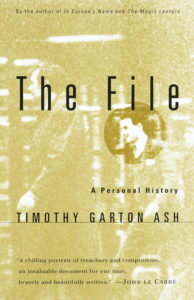 Another sleeper!
Another sleeper!
A neighbor and compulsive reader — as I am too — gave me this paperback with her encouragement. As I started to read, I was somewhat dubious. After all, what is there to interest me in reading about a young Oxford grad student going to Berlin in 1978, and then on to Humboldt University in East Berlin in 1980 to continue his work.
But … it seems this student (the author) was almost immediately the focus of the East German Stasi police, which assumed that he must be an English spy. Shades of John LeCarré.
He guessed, of course, that he might be suspected, but he never realized the extent of the German suspicions and the degree of its work until after the reunion of East and West Germany, and the opening of the Stasi files to his review.
It was, as Ash describes it, “the quiet corruption of mature totalitarianism.” He then went back and first investigated the files on him, and then decided to try and interview many of those who reported on him, some of whom were good friends.
This is the story of what he learned. It is both compelling and fascinating.
He goes on to describe some of their excuses. “I did my job” is the most common, responding to the overwhelming pressure of a repressive and suspicious government.
But what is exceptional about this personal history is its extrapolation to all of us.
Do not many — if not most — of us have that compulsive certainty that we always face “enemies” to be identified, fought and then conquered? It is the classic “us” versus “them”, but, as Pogo correctly pointed out, “We have met the enemy and he is us.”
At the same time as the Stasi was investigating both Germans and foreigners, MI6 in England and the CIA in the U.S. were hard at work doing the very same things.
Ash’s conclusion, “ … the paradox at the head of all spying: the key to betrayal is trust.”
But can we really rely on what we have read and what we think we remember?
Ash asks, “How can you ever really know what is fact, what fiction, and what still lies hidden?” The answer is we can’t — there is no such thing as “fact.”
Ash continues, “What we call ‘my life’ is a constantly rewritten version of our own past … Personal memory is such a slippery customer … Our memories decay or sharpen, mellow or sour, with the passage of time and the change of circumstances.”
His conclusion: “Now the galling thing is to discover how much I have forgotten of my own life.”
Me too …
Despite my reliance on many old records saved over the years, when I came to write my own “autobiography” in 2011, I had to acknowledge, candidly, that it was basically a work of fiction!
Editor’s Note: ‘The File’ by Timothy Garton Ash was published by Vintage Books, New York in 1998.